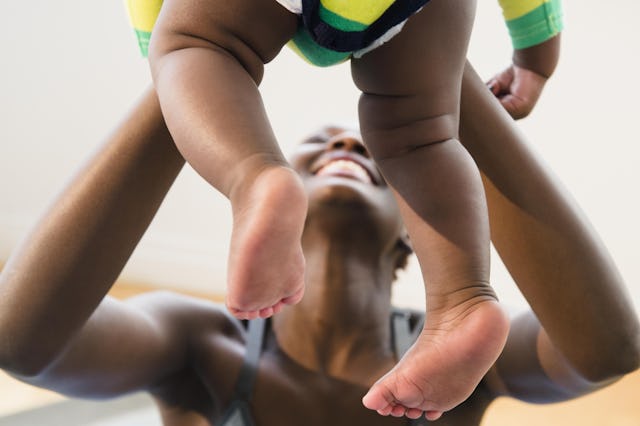How I’m Talking To My Sons About Race In America As A Black Mom
I want to have hope — but I also feel like a broken record.

While the last two years have left all moms collectively exhausted, as a Black mom, I’m also traumatized. Today marks two years since George Floyd was murdered by a police officer in Minnesota and, as I reflect on what’s happened since, I’m torn.
I want to have hope. I want to have hope that my two boys, who are 5 and 2 years old, can grow up in a world where they are fully accepted and safe. I hope that all of the people who were outraged after watching the footage of George Floyd’s murder will become allies and stay engaged, speaking out against injustice everywhere.
But the lack of true progress since, as well as recent events, leaves me sad. Two years ago we saw companies and people putting up statements on race and diversity, posting Black squares on Instagram, and joining virtual conversations about race. But some of the air has already hissed out of the bubble. The conversations are happening less and less; the attention is waning as time moves on. And I feel like a broken record, having the same conversations as two years ago with my coworkers, acquaintances, in my writing, and on social media. After the first anniversary I felt charged to see major nationwide change — and now I’m realizing that the change I can actually see and participate in will happen with the people I directly influence, my children.
Where does that leave us? The Washington Post recently released a poll that found that 75% of Black adults are very or somewhat worried that they or someone they love will be attacked because of the color of their skin. Just over a week ago, residents in Buffalo, New York were targeted and killed just for being Black, while doing something as heartbreakingly everyday as shopping for groceries. The Buffalo shooting leaves me no choice but to be concerned each day: I know that the simple tasks and errands of life could be a danger.
My two young boys need to know both these sides of the coin, and I’m not entirely sure how I’m going to explain it to them. I do not know how to balance their childlike joy with the reality that they will most likely have a different experience in life than some of their classmates.
So here’s where I’m starting: We have had many conversations about simple things, like how our skin colors are different within our own family and amongst our friends. We talk about why we look different, and I’ve found that by directly addressing their questions, they feel comfortable talking to me about these topics. When there are big news stories, I let them know that bad things happen in the world but confirm that they are safe. I have not started explaining the “why” behind these events. As young children they are not ready for the deeper conversations — but they deserve to be introduced to current and historical events. I will trust my intuition and instincts to know when they are individually ready to learn more.
As Black moms, we have been exposed to psychologically damaging events. We are tired and worried. We need access to power, the ability to vote freely, and changes in legislation to start. And despite it all, we still have to be present parents. In a single day, I can go from seeing terrorism in the news, to experiencing micro aggressions at work, to caring for my Black sons. It can take a lot out of a person emotionally.
Ultimately, though, I am a “glass half full” type of person, and so I try to focus on how much impact I can make with how I raise my boys. I make our home a place where they and their friends can truly be themselves, relax, feel safe, and ask questions. And I’m also excited to go all out celebrating Juneteenth — the June 19th holiday commemorating the end of slavery — this year, because my sons are now old enough to understand why it is now a national holiday. This year, we’re going to read a few books about Juneteenth, starting with The Juneteenth Story: Celebrating the End of Slavery in the United States by Alliah L. Agostini and eat some of our family's comfort foods as an introduction to our past. Building greater understanding within our communities through events like Juneteenth are a great start to call in those who have taken their foot off the gas in the drive toward equality.
As mothers who want better for our children, I say: Let’s get back to it. We have more work to do.
Rachel Pierre is an innovative strategist, writer, podcaster, and mom of 2 incredible boys. As the founder of Mommifaceted Media, Rachel shares the stories of black motherhood in all facets of life and connects lifestyle brands to moms of color so they can build authenticity and true community. In 2022, Rachel is launching a podcast network to highlight black mom podcasters.